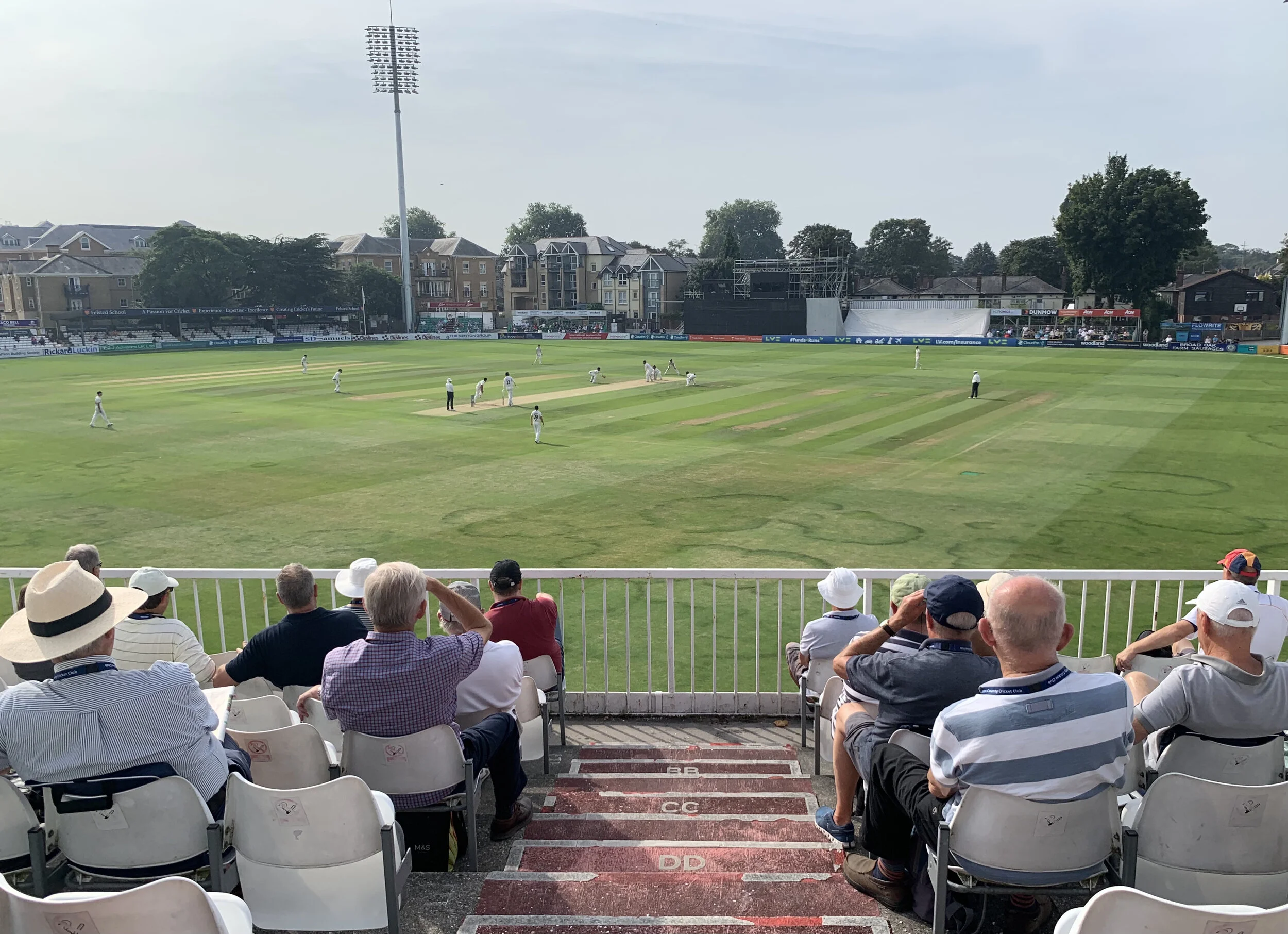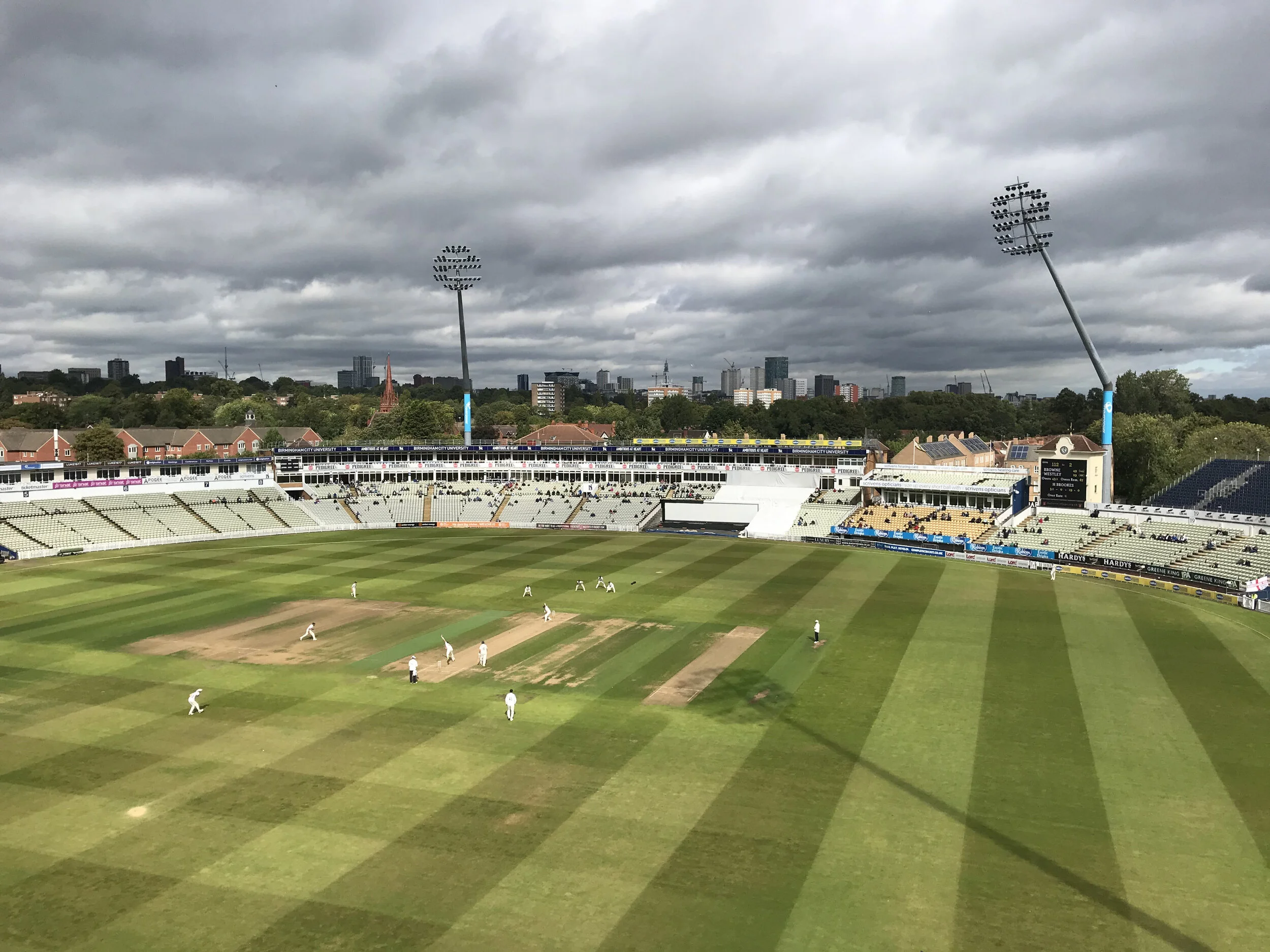We love seeing the youngsters play but it helps county finances too
* Sign up to my FREE weekly County Cricket newsletter
Paul Hardcastle was not one of those unfamiliar names in the Sussex side for the Championship game with Worcestershire this week. In fact, I doubt he even plays cricket.
However, he immediately came to mind when I perused the team-sheet from the game at Hove.
Sussex had named the youngest line-up in Championship history with six teenagers, no capped players and a skipper barely into his twenties. Their average age was 19.6.
Or n-n-n-n-nineteen point six, as Hardcastle’s 1985 smash hit would put it.
That number referred to the average age of a combat soldier in the Vietnam war and, with due reverence to the Joe Leach, Dillon Pennington and the rest of the Worcestershire bowling ‘attack’, it is hardly the same sort of enemy. However, both figures did reveal that boys were doing a man’s job.
After a breakthrough campaign in white-ball cricket, Archie Lenham was making his first-class debut against Worcestershire. Earlier this season, Dan Ibrahim hit the Championship's youngest half-century and, on September 6 last year, James Coles had become the youngest first-class player for Sussex at 16 years 157 days.
Clearly, they are breeding them young on the south coast these days. But it is a trend we have been seeing elsewhere during the 2021 county season. Over 100 players made their List-A debuts in the Royal London Cup last month, many of them born this millennium.
The overwhelming reason for this was the Hundred, who pilfered their squads from the counties to such an extent that there was talk of the 50-over competition being rendered so meaningless that it would be cancelled this year.
In fact, for legacy fans such as myself, the Royal London Cup was something of a silver lining to the tournament that so clouded our season. But such a disruptive event is bound to have numerous unintended consequences, especially when you toss in the effect of a once-in-a-lifetime pandemic.
Back in March, research from Sheffield University suggested that the effects of Covid had left a £120m hole in the finances of the county game. One of the smaller counties, Leicestershire, estimated their shortfall was £1.5m but bigger organisations with the overheads of hotels and conferencing businesses would be likely to suffer much greater losses.
When lockdown meant fans were shut out of last season, staffs at counties were cut or furloughed, thousands of members donated their annual fees and, to their credit, the ECB stepped in swiftly with a financial package. Given the gravity of the situation, it seems incredible that we kept the lights on at all 18 first-class counties.
The maskless masses in your local supermarket suggests that much of the UK thinks it is through the worst of Covid. This is wrong. Just wait for the spikes in the next few months after the schools and universities return. The success of the vaccine roll-out has not stymied the infection rate, merely the seriousness of its effects.
But we can all agree that the bill for the pandemic has yet to be paid. The furlough scheme does not end until September 30 and yet the Office for Budget Responsibility estimates the cost to be around £66bn. Hopefully, everyone, even those rich tax-dodging multi-nationals, will be paying their share when it is passed on.
The critical events of the last two years – the Hundred and the pandemic – have combined to make the first-class counties even more dependent than before on central funding. To add insult to financial injury, the extension to the stupidly-named “Freedom Day” saw restrictions come down at midnight on Monday, July 19, less than six hours after the group games of the Vitality Blast had concluded. So most counties missed out on their biggest money-spinner for the second season in succession.
A limited number of fans had been allowed in before that but restrictions were stringent, especially at the smaller grounds, and costs could be high. Essex estimated an additional £80,000 was needed to cover the Covid-related regulations of a four-day game at Chelmsford with 600 in attendance.
Therefore, perhaps it is no wonder that the two most experienced players not figuring in the first-team, Matt Quinn and Varun Chopra, were loaned to Kent and Middlesex respectively, in the middle of this season. Elsewhere, seasoned players like Sam Northeast, Nick Gubbins, Mark Stoneman and Alex Thomson have all moved permanently or on loan. Late season moves happen every year but 2021 seems to be have been particularly busy.
Getting them off the wage bill and playing younger, cheaper players makes financial sense in this climate. Especially as Royal London Cup sides were expected to be young and, when the Championship returned in August, two-thirds of the teams had nothing to play for.
That’s why Somerset, Warwickshire and Hampshire have added the likes of Azhar Ali, Chemar Holder and Mohammed Abbas as they go for the title while Travis Head (Sussex) and Peter Siddle (Essex) have not been replaced after returning to Australia.
As I said, there is an upside to all this, county fans love seeing youngsters given a go and the Sussex v Worcestershire game saw both sides field 10 players brought through their academies.
But the wider concern for county cricket is precisely the same as that of UK society. Namely that the pandemic will provide a convenient cover to accelerate a process that has been going on for some time.
The concentration of money and resources not to the many but the few.
* This article first appeared in The Cricket Paper, get it every Sunday or subscribe here
* Sign up to my FREE weekly County Cricket newsletter
If you like cricket, please consider buying my book, Last-Wicket Stand: Searching for Redemption, Revival and a Reason to Persevere in English County Cricket
🏴☠️ Buy from Independent bookshop 💰 Buy from Amazon | 👨💻 Buy from me | 🇺🇸 Buy in USA | 🇦🇺 Buy in Australia
-
February 2025
- Feb 16, 2025 The enshitification of cricket Feb 16, 2025
-
August 2023
- Aug 8, 2023 Because cricketers are worth it. Greed, ego and contract negotiations Aug 8, 2023
-
May 2023
- May 20, 2023 COUNTY CRICKET BLOG: Blast preview | Foxes put meaning over money | Should Essex house Tigers? | Lancs v Somerset declaration row | Roach goes home | Lancs try to change rules at AGM May 20, 2023
- May 12, 2023 COUNTY CRICKET BLOG: Marketing trends in County Cricket | Week 6 Previews | Chaos at Derby | Cricket Paper back this weekend | Why invest in Yorkshire? | Tom Harrison paid £1.13m in final four months May 12, 2023
-
April 2023
- Apr 29, 2023 COUNTY CRICKET BLOG: Week 3 reviews | 12-month IPL contracts offered to England players | Own your mistakes! | Sort out 'reciprocal' rights for county members | Tom Price heroics Apr 29, 2023
- Apr 21, 2023 COUNTY CRICKET BLOG: Championship Week 3 previews | Ballance retires | The dangerous ageism of labelling older fans 'a problem' | Saudi Arabia T20 threat | Oh Mickey (Arthur), you're so fine Apr 21, 2023
- March 2023
- February 2023
- December 2022
-
November 2022
- Nov 18, 2022 COUNTY CRICKET BLOG: ECB change board | Back to an eight-team top division? | Smeed's move the first of many? | Hogan unretires | Major deals at Notts | Yorks racism hearing ramps up Nov 18, 2022
- Nov 3, 2022 COUNTY CRICKET BLOG: Richard Gould - the right CEO for the ECB ? | Shock Rushworth move | Yorkshire's key changes | New contracts - Wood, Barker, Hain | Surrey, Worcs coach appts Nov 3, 2022
-
October 2022
- Oct 21, 2022 COUNTY CRICKET BLOG: Will a county 'go under' like Wasps? | Key says support you-know-what | Buttler & Croft contracts at Lancs | Yorks racism hearing in public? | Benefit Years no more? Oct 21, 2022
- Oct 8, 2022 COUNTY CRICKET BLOG: Angry reaction to Yorks' relegation | County Awards | Teams of the season | Will counties vote against Strauss Review? | Should we split cricket into two codes? Oct 8, 2022
-
September 2022
- Sep 30, 2022 COUNTY CRICKET BLOG: Fantastic finale to the Champ season | Success at Surrey, Notts & Middx | Warks send Yorks down | Strauss Review reaction - and it's not good | Hildreth and Hogan farewells Sep 30, 2022
- Sep 16, 2022 COUNTY CRICKET BLOG: Should high performance mean high priority? | Royal London Cup previews | You-know-what 'least enjoyable' competition | $10m fine shows ECB the way on fighting racism Sep 16, 2022
- Sep 12, 2022 COUNTY CRICKET BLOG: Thompson delays county vote on Strauss review | Media blitz - Fri night Blast games, transfer window, player exodus | "One man and a dog" - still!!! | You-know-what Yr 2 figures Sep 12, 2022
-
August 2022
- Aug 18, 2022 COUNTY CRICKET BLOG: 'Over my dead body' CEO on cutting counties | The schedule is a pretzel or a Rubik's cube | Hildreth retires early | Thompson's in-tray | My Faustian bargain Aug 18, 2022
- Aug 16, 2022 COUNTY CRICKET BLOG: Thompson appointed ECB chair | Special General Meeting forced at Lancashire | Yorks tribunal underway | Flintoff's Field of Dreams considered | Stevens to leave Kent Aug 16, 2022
- Aug 3, 2022 COUNTY CRICKET BLOG: Major moves announced | Yorks change captain | Royal London Cup is not an 'alternative' | What Dr Who tells us about the demise of county cricket | Loads of pessimism, sorry Aug 3, 2022
- Aug 1, 2022 COUNTY CRICKET BLOG: Will counties lose that £1.3m payment? | Why the balls have gone soft | Join Campaign to Save First-Class Cricket | B&H Cup 50 years on | Northeast's 410* Aug 1, 2022
-
July 2022
- Jul 20, 2022 COUNTY CRICKET BLOG: Why first-class county cricket will be gone in six years Jul 20, 2022
- Jul 14, 2022 COUNTY CRICKET BLOG: Scarbados and Southport shine | Lancs Action Group rally members | Why do 'outsiders' love the Champ | What change will YOU make to save the game? Jul 14, 2022
- Jul 2, 2022 COUNTY CRICKET BLOG: What Wimbledon can teach English cricket | Vaughan off-air | Gale's parting shot | Sibley, Barnard moves | 'Bazball' in the county game | Who's out of contract Jul 2, 2022
-
June 2022
- Jun 24, 2022 COUNTY CRICKET BLOG: Last four Yorks chairs blast ECB | Champ games to be played in UAE or Sri Lanka? | Introducing the 6ixty | Seriously, how to replace the ECB? | Big Somerset signing Jun 24, 2022
- Jun 17, 2022 COUNTY CRICKET BLOG: Yorkshire and former players charged | Willey returns to Northants | Moeen, Sibley to move? | Chesterfield of dreams | YouTube stream hacks Jun 17, 2022
- Jun 9, 2022 COUNTY CRICKET BLOG: Blast catches fire at last | Sky's schedule, fights and food problems | Why fan engagement is the key | Yorkshire payouts Jun 9, 2022
- Jun 2, 2022 COUNTY CRICKET BLOG: Blast crowds struggling, are you surprised? | Foxes fight back with £10 deal | Key to cut Championship games? | Fans' banners taken down | Jim Parks RIP Jun 2, 2022
-
May 2022
- May 26, 2022 COUNTY CRICKET BLOG: T20 Blast Off | Ticket sales struggling because of you-know-what? | Has Championship been a let-down so far? | Surrey's classy gesture | Big sponsorship deal for Lancs May 26, 2022
- May 19, 2022 COUNTY CRICKET BLOG: ECB CEO Tom Harrison goes... finally | Have bad balls helped batters? | Bees stop play | Where you get in free after tea | Why should we listen to ex-players? May 19, 2022
- May 14, 2022 COUNTY CRICKET BLOG: Is a different Dukes ball the reason for all the runs? | Finally, an ECB chair we can believe in? | Sparkling new Potts |Best of the blogs May 14, 2022
- May 5, 2022 COUNTY CRICKET BLOG: Should Joe Clarke play for England? | Essex boardroom problems | Six ducks for Kent tail-ender | Yet more ECB nonsense May 5, 2022
-
April 2022
- Apr 24, 2022 COUNTY CRICKET BLOG: Strauss Review nonsense | Key appointment doubts | Compton's stunning start | TalkSPORT's quality coverage | Syd Lawrence Apr 24, 2022
- Apr 15, 2022 COUNTY CRICKET BLOG: All the Championship previews | Mickey Arthur defends county cricket | A list of the ECB's mistakes this week | Player moves Apr 15, 2022
- Apr 7, 2022 COUNTY CRICKET BLOG: All the County Championship previews | Fantasy League tips | Bumble speaks out | Latest player moves | And 'Teflon Tom' wants to secure 'his legacy' Apr 7, 2022
-
March 2022
- Mar 28, 2022 COUNTY CRICKET BLOG: Should we have a fan-led review? | Surprise! Talk of culling some counties | Yorkshire can't get out of their own way | Should the ECB fine themselves? | All the moves Mar 28, 2022
- Mar 7, 2022 COUNTY CRICKET BLOG: Warne remembered by Hampshire | Power struggles at top of the county game | More trouble at Yorkshire | Should Durham be asking questions? | Lots of new signings Mar 7, 2022
-
February 2022
- Feb 18, 2022 COUNTY CRICKET BLOG: 'Civil War' at Yorkshire | Why Tom Harrison is cricket's Chesney Hawkes? | Mickey Arthur flies in | Surrey's 15k members | Davies banned for tweets | All the player moves Feb 18, 2022
- Feb 2, 2022 COUNTY CRICKET BLOG: Angry about the fixtures, the Yorkshire scandal and especially the ECB... here's why Feb 2, 2022
- January 2022
-
December 2021
- Dec 24, 2021 BLOG: All the major player moves & contracts | Exploring Cricket & class | A right old 'Codgerfest' | Counties redeveloping grounds | Changes at Yorkshire | Peter O'Toole taught by Imran Khan Dec 24, 2021
- Dec 10, 2021 BLOG: Yorkshire look to rebuild | Lancashire's new ground | Coaching changes at Hants | Northants and Derbyshire overseas signings | All the latest player moves | Delay on 2022 fixture announcements Dec 10, 2021
-
November 2021
- Nov 28, 2021 BLOG: Latest on Yorkshire racism scandal, all the county cricket moves, are ECB 'fit for purpose'? Nov 28, 2021
- Nov 10, 2021 Sign up FREE to the only County Cricket newsletter - all the latest in one place Nov 10, 2021
-
October 2021
- Oct 28, 2021 It seems you can't wish Geoffrey Boycott a happy birthday anymore Oct 28, 2021
- Oct 1, 2021 The Championship must find its niche again and Mason Crane must not ruin my Spag Bol again Oct 1, 2021
- Oct 1, 2021 The Grumbler's County Championship team of the season - 2021 Oct 1, 2021
- Oct 1, 2021 How to say goodbye to a cricket season, career or life Oct 1, 2021
-
September 2021
- Sep 14, 2021 Dear Mr Dowden, first-class counties are 'art treasures' too Sep 14, 2021
- Sep 8, 2021 We love seeing the youngsters play but it helps county finances too Sep 8, 2021
- Sep 1, 2021 Why watch when there is nothing to play for? Sep 1, 2021
-
August 2021
- Aug 24, 2021 The intended consequence of diminished horizons Aug 24, 2021
- Aug 18, 2021 Like the many who will follow him, red-ball Ravi will be missed Aug 18, 2021
- Aug 11, 2021 Cricket needs diversity from all sides Aug 11, 2021
- Aug 3, 2021 Gimmickry can help county cricket too Aug 3, 2021
-
July 2021
- Jul 29, 2021 50 and out? Why one-day cricket may fall through the cracks Jul 29, 2021
- Jul 20, 2021 A failure of governance Jul 20, 2021
- Jul 13, 2021 Cricket, data and Foxes Jul 13, 2021
- Jul 9, 2021 Lessons from six months of creating county cricket content Jul 9, 2021
-
June 2021
- Jun 30, 2021 What happens when you become a cricket 'meme’ Jun 30, 2021
- Jun 21, 2021 How 'Hobbiton' is starting a village cricket team during a pandemic Jun 21, 2021
- Jun 15, 2021 Where's the fun? Derek Randall and Spinwash show the joyful chaos of yesteryear Jun 15, 2021
- Jun 9, 2021 County cricket fans are having their say... and their 'When Saturday Comes' moment Jun 9, 2021
- Jun 2, 2021 Why cricket's best YouTube channel is under threat Jun 2, 2021
-
May 2021
- May 26, 2021 Fanning the flames for REAL supporter representation May 26, 2021
- May 18, 2021 Getting back in the ground, it’s going to be pretty damn emotional May 18, 2021
- May 18, 2021 By the end of this season, we’ll know if traditional county cricket has been outgunned May 18, 2021
-
October 2020
- Oct 7, 2020 Vitality Blast: Team of the Season 2020 Oct 7, 2020
- Oct 7, 2020 Streaming offers red-ball cricket a lifeline Oct 7, 2020
- Oct 7, 2020 My T20 finals days: Michelangelo, Kiss Cam and the Sugababes Oct 7, 2020
-
September 2020
- Sep 30, 2020 The Grumbler's Team of the Bob Willis Trophy 2020 Sep 30, 2020
- Sep 30, 2020 Barmy Army 'batten down hatches' as Covid hits cricket tour business Sep 30, 2020
- Sep 30, 2020 No-one marketed the Bob Willis Trophy final, so I did it myself for a tenner Sep 30, 2020
- Sep 24, 2020 Udal on Parkinson's Disease - 'When you play cricket, you learn to fight' Sep 24, 2020
- Sep 24, 2020 Tom Banton's not Somerset's Messiah, he's a very naughty boy Sep 24, 2020
- Sep 24, 2020 Why cricket fans will mourn this season more than most Sep 24, 2020
- Sep 10, 2020 Cold-blooded Murtagh takes on Donald Trump's spinner Sep 10, 2020
- Sep 10, 2020 By George, he's the proud No11, batting in his mother's memory Sep 10, 2020
- Sep 10, 2020 Bring back the 'FA Cup' of cricket Sep 10, 2020
- Sep 10, 2020 County game grows viewership via stream power Sep 10, 2020
- Sep 9, 2020 Financial nous like ‘Barnacle’ Bailey can guide cricket though the pandemic Sep 9, 2020





